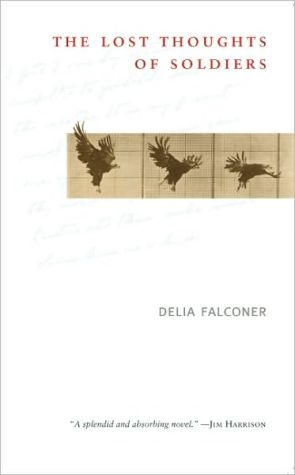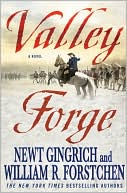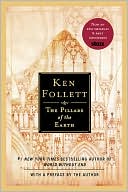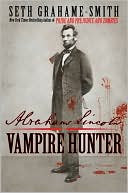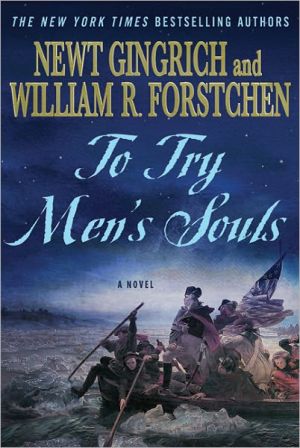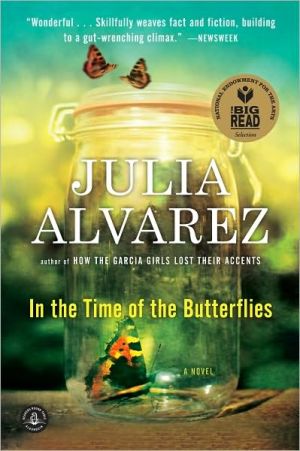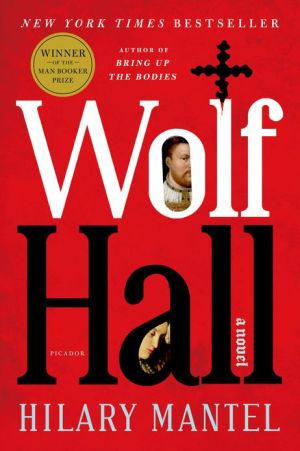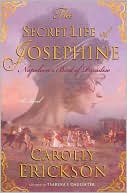The Lost Thoughts of Soldiers
Georgia, 1898: On what may be the last day of his life, Captain Frederick Benteen — the man who, in the minds of many Americans, might have saved Custer’s Seventh Cavalry from death at Little Bighorn — receives a letter from an ambitious boy offering to “restore” his reputation. In the years since, Benteen has silently watched as the public canonized Custer for dying and cursed Benteen for surviving.\ Now, at last, as he begins to put down some account of those two horrific days pinned down...
Search in google:
Georgia, 1898: On what may be the last day of his life, Captain Frederick Benteen — the man who, in the minds of many Americans, might have saved Custer’s Seventh Cavalry from death at Little Bighorn — receives a letter from an ambitious boy offering to “restore” his reputation. In the years since, Benteen has silently watched as the public canonized Custer for dying and cursed Benteen for surviving. Now, at last, as he begins to put down some account of those two horrific days pinned down on a ridge in Montana, Benteen finds himself haunted by his lost companions: Star-Gazer, Handsome Jack, the gentle bugler De Rudio, and the Choir, a host of misfits who hover at the edges of the action. Benteen struggles to untangle his own story, his own worth, from the grand narrative of history and the “nine tenths nothing" that make up battle. Funny, moving, rich in character and incident, this acclaimed novel avoids the bloody battle scenes and maudlin romance that characterize much fiction about the American-Indian wars in favor of an unsparing and poetic story that explores what it means to be a soldier — then and now.
The Lost Thoughts of Soldiers\ \ By Delia Falconer \ Soft Skull Press\ ISBN: 1-933368-17-9 \ \ \ Chapter One\ He moves indirectly. \ Following creases in the daylight. At dawn, before he can get to the shaving mirror, he is standing here in the kitchen in his singlet, the wet brush in his hand.\ Odd paths his feet take these days. Heading out to shred his pipe plug on the doorstep, he finds himself in the study, staring at the leaning spines of books. He stands by doors and feels the handles. He spends half-days at the windows, his hands in his pockets, his hips against the sills.\ There is a slow brown river at the bottom of the garden. For two hours yesterday he watched it, in the middle of the afternoon, when he had intended to close the shutters and take his nap. His wife found him, shoeless, sitting on the landing. Small drops of rain in the dull grey heat around them. An electric hiss on the water's surface. The smell of soil and green things washing from the edges. He took Frabbie's hand and made her lean down to feel the cool airspace, rising, that formed beneath his feet.\ The quiet drift of flour to the table. A strange calm at sunrise that he associates with armies.\ Lathered up, his braces hanging from his waist, he stands against the kitchen doorway. The maid slaps the bottom of the sieve and stirs the sausage gravy, pretending not to see.\ * * *\ Indoors he can feel the river turning over.\ The fronts of houses here are blank, the real life centred around themuscle of the water. The town is an afterthought, its main street beginning a quarter-mile from his front door.\ His father built this house here, in Georgia, on the riverbank, naming it The Shadows. Ten rooms, thick walls, cold flagstones on the veranda. There are wet hydrangeas beneath the windows, watered already by the staff.\ When he was a boy his father showed him on a map how neatly these plantations lined themselves up along the river. A surprise how their straight edges gridded outwards from the banks, since he had only learned the shaded lanes which wound between them. These roads take unpredictable jinks, turn suddenly catty-corner towards the water and loop back, someone told him, because the surveyors who planned them had been drunk. They laid them down through the bone orchards, the cemeteries of the poor. Fragments of collarbone and femur still rise up sometimes, bleached and glowing, after heavy rains.\ Often the poor were buried with their silver. That was an unforgettable sound of his childhood, the percussion against their own carriage wheels of a tarnished candlestick or fork.\ Stale pain on his breath-and, he suspects, a more feral stink about the groin. His bladder aches, his skin is goosebumped.\ He thinks, I must cellar my body here like rotting fruit.\ He has installed a small water closet in his study, behind a screen, so that he does not have to haul himself upstairs as often to the bedroom. He opens the door and sees the husky outline of his desk, the dull shapes of handguns lined up along the top shelf of a bookcase. Mould and coal-dust in the closed-up air. There are thin bright lines across the window, but he does not open it, he wants to feel shapeless a little longer.\ The urge to urinate is constant, the results are always paltry. Lately he has taken to carrying the pan out through the back door to the rose beds, watching the ants run when he pours his trickle on the damp soil near the roots. In New York, in a dark cathedral entrance, an old nun once sold him candy. She told him how the monks would piss in the stained glass when it was molten to produce the creamy yellow. That one thought changed the whole of Europe for him. She had mimed it, leaning backwards, the invisible cock in one clawed hand. Her old eyes were bright, but not salacious. He recognised her as a young girl in a farmyard. He feels a cousin pleasure here, in the thought of his own sluggish fluids emerging perfumed and phosphorescent in those canary-yellow blooms.\ He sleeps naked these days beside his wife, his body as white as those a flood or warfare leave.\ His mind also wanders. His life a set of dark rooms which he moves through. Some things he remembers, others he seems to have imagined.\ One night in winter, many years ago, when they were tenting in Nebraska, Frabbie wanted him to wake and touch her. So she took an icy handful of lead shot and dropped it in his lap.\ * * *\ He hears muffled birdsong through the window and knows the sky has broken. A shift in the day, like religion starting. You can only feel it later, you cannot spot where it begins.\ At the far end of the garden the ducks run up to greet him. They look like feathered lizards; he likes the meanness of their reptile eyes, those scaly legs. Beyond the beds of flowers and the benches they have made this section of the lawn a quagmire-there are musky droppings and feathers churned up with the thick dark mud. A hint of phlegm that reminds him of the floors of bars so rank with throat oysters that if you leaned forward to tie your shoelace it could nearly make you faint. The female has hatched six ducklings. They skim madly across the water, away from her, then reconverge; darting at sharp angles, as swift as marbles on an ice rink.\ For a while he measures time in breadcrumbs.\ He has the dim feeling this may be a church day. No groundsman in the yard, hurried bangs and clatters from the kitchen. The air is tense with the metallic sense of bells anticipating. The birds seem less eager for the bread, as if they know they will soon feast on the wedding rice that floats downstream from the town.\ Yesterday, when he had finished shaving in the study, the lather had gone lardy; he had to wet and scrape it with his nails, as if he had botched his death mask. He keeps another kit in there, behind the curtain, in the same way that he has the second water closet, or hides the extra matches on tabletops and ledges in the house. He hopes he does not end up like the old people he sees parked out on porches, on divans, nodding in the sunlight; who appear in the backgrounds of photographs, their jaws a blur, as if they chew imaginary bacon. There is a grim pleasure, though, in imagining the future: forbidden lamps and candles by his son. The names of friends in his pockets on little scraps of paper. Notes on the piano from his wife, reminding him to bathe.\ Two crows as sleek as big black cats linger on the edges of the quacking, and take it in turns to hop in with pointed ease to steal a mouthful. He throws a crust to a drake that has lost a foot to a trapper or a fish.\ Since those two days pinned down on the ridge at Little Bighorn he has been able to feel his own life, and that is no good thing. Sometimes it floats like a shadowy cast before his eyes, filling and unfilling like a curtain. Sometimes it is a high, ecstatic whistling in his head, like the wind on those grass hills that leaped into their mouths and scrubbed the hollows of their skulls. At other times, like now, it is a sad and solitary thing, no bigger than a mouse or frog, a timid weight.\ His slippers are black and unsaveable, he guesses.\ But he is safe, within the grey heart of the morning.\ Last night, pressed against his wife's back, he dreamed of a field of daffodils, each filled to the brim with piss.\ * * *\ There is a weight in the sunlight now across his shoulders.\ The sounds of a carriage on the road.\ The odour of coffee, like the spunky whiff of some secret body fluid, finds him, as it unwinds across the grass. Always, it has been this smell that lets him know he is alive, the steam moistening his chin, the hot cup between his hands. Out on the plains when the men were frozen and bone-weary they would sometimes rest their heads sideways on their mugs, to imagine the hot breath of wives and lovers in their ears.\ He detours past the kitchen garden and the rose beds to the ice house; past the ghost garden, a bed of pale grey lambs' tongues and silver creepers that grow in the shade provided by the house.\ Inside, he sees nothing at first but blackness and the vapour of his breath. Vegetables and flesh in hibernation in the pit below him. He hears tiny fissures open in the ice like the infinitesimal and random tickings of little pocket watches. Maggots sound similar, he recalls-a more liquidy eagerness about the ticking as they burrow through a corpse.\ The ice is cut in January, when it is thickest, from frozen ponds in New England, and packed in sawdust and transported southwards in the train. Sometimes, when it is delivered, he will stand by the back of the cart and brush the chaff from the wet surface of the blocks. It is often possible to see a pale silver fish or water-skimming insect suspended beneath the surface, some creature deficient in suspicious instincts, surprised by the swiftness with which the water froze.\ * * *\ He had almost forgotten the woman.\ The night before the fighting, in the cold dark, she had slipped as quiet as a ghost out of the cottonwoods' brown shadow. Her face when she asked them for some dollars was untouchable and grave. She led and they had followed, a dozen of them, Custer, Young Tom, himself, the officers Star-Gazer and Handsome Jack, some of the enlisted men, down to the Rosebud's banks. Their footsteps Indian quiet. The same bright mercury in their chests as they felt before a charge. Glancing sidelong at each other's eyes to see dog appetite and fear.\ How vast it was and black, that untelegraphed land.\ Her straight back electric in a white cotton dress.\ Did the others also feel it on nights like this-the sudden longing to see their sperm spill like silver coins across the ground?\ She stopped at the river, which they smelled but could not see since there was no moon. Only the feeling that they had reached the edge where the land broke, its wet seam, the movement of chill water from high mountains. They shivered, although the air around them still held the terrible stillness of the day.\ When the clouds passed they saw that she had left her dress on the bank, folded as if to make a gift around her boots. She floated on her back, the river halfway up her chest, as if asleep. Their throats ached with the beauty of it. Her white skin. The soft movement of the fur down there. A small hand just breaking the surface like a turtle's back.\ The moon took another spell and she was gone.\ Later, in spite of his tiredness, he would lie beneath his blanket with his eyes closed, imagining her cold breast, and direct his own hot gush across his hand.\ * * *\ The dining-room door is open, the shutters thrown back, the silver on the table as he passes. A stack of napkins on the sideboard, not yet folded and laid out beside the plates. Some ruffled, no longer deadpan feeling, suddenly, about these hollow rooms on either side of the corridor. The humid air that has followed him through the back door lingers for a moment at the entrance to the study, then retreats.\ When he was discharged he bought himself this armchair for the study, which he sits in now, the plushest and deepest he could find. It is true, that old soldiers' tale that years of riding shake the stuffing from you. This morning he feels as if he has just dismounted. His medicine bottles, made of muddy brown glass, are lined up before him on the table. He uses them as paperweights. Filled with liquids to different heights, they hold down old route maps, newspapers, unanswered correspondence, thin account books. Raleigh, Vaughan, Swannanoa-he can sit for hours feeling the names of places in high raised letters on the glass.\ He takes a draught of something astringent from a bottle and leans back. Which is for the inside or the outside, guesswork sometimes. The alcohol whiff on his fingers when he caps it.\ A bar in Texas which the locals called 'Snake Nation.' There was a regular there who would call you over, ask if you wanted to see his baby rabbit, then open up his jacket. Beneath his heart, the liver was voluptuous and swollen, quivering, as if some shy animal breathed beneath the tight, white skin.\ * * *\ In the bedroom above, he hears his wife Frabbie's steps. Sure movements-she does not pause, as he does when his feet first hit the floorboards, to gauge the weight of morning. Six quick paces to the water closet, the muffled sounds of dressing. She will leave it for the maid to throw the shutters open. She will not linger in her nightdress at the window. There will be a brief stop at the mirror, no vanity about her.\ She walks swiftly, at the centre of her slippers.\ The difference in footsteps. Some organ in the body of tiny registrations. In the army, on the night watch, he could instantly sense a set of 'cool steps,' the term he used to think of them by, the approach of unknown feet.\ The first time he asked Frabbie for a dance she had snatched at his hands, the way spinsters grab a cat or baby, as if they want to pull its love up by the roots. Something in that eagerness which moved him. Her broad back beneath his palm, lean thighs against his own. She held his arm tight as they stepped together, her thumb tucked in the firm groove of his muscles. The thrill of her finger there between the tendons each time he turned her in the waltz.\ He feels his tailbone press against the cushions. Relentless riding severs old connections and reroutes them: the discretion of soft organs, the heart's place in the chest, are all disrupted. Instead, new avenues for pain develop. Tailbone might connect to kneebone, sternum to rectum, hand to thigh.\ There is a rose bud on his desk, pale pink, the head still beaded, that he has brought in for her from the garden. The carriage clock, Chinese vase, framed portraits, are still part of the mantel's bulk in these last moments of the half-light.\ Soon, he thinks, all these things will be antiques. He takes the opener from its sheath and begins to sort the letters. Some are old, and brittle from being left in his study since the winter, the paper thinned and dried out by the fire. He splits the envelopes cleanly, although his hands are shaking. He feels their corners in the soft flesh of his palm.\ A year afterward, in their honeymoon bed, both virgins, she squeezed his cock in her long dry fingers. Both saw the small hole open, both heard the tiny click.\ * * *\ There is a self-centred inward-turning quality about this time of year. Things draw the steam in, expanding on their essence. In two days the slippers he has shucked off at the doorstep and aligned neatly side by side beneath the scraper will be as mouldy as pumpkins. If he leaves the bottle uncapped before he goes to bed he will find small green clots like duckweed on the surface of his ink.\ A strange, aggressive softness.\ He unfolds the sheets of paper, spreads them out.\ Twenty years after that whole grief show and they still chase the corpse of Custer. He shuffles through the letters-a retired West Pointer, he can tell by the high military loops of careful copperplate; a doctor's scrawl, the headlong green ink of a madman. Some enclose long monographs, hoping for corrections. Others, crosses and lines on ornate maps. Some ask for nothing, but these he finds the most disturbing, as if they extract some shapeless promise from him. They send him clippings from the newspapers, where they advance their theories on the battle. Underlinings in thick pencil, long column-inches folded around their cards.\ Why is it that only men write? After all, if an opinion is on the menu he has never known a woman to refuse it. But there is more than argument, he thinks, in these frail pages.\ The shy atheism of the male. He remembers from the army. A touching need to find their gods in one another on this earth.\ * * *\ He hears voices on the street beyond the window, filtered through warm church-light. A shift in bird-life towards the workmen's noises; he feels swift shadows touch the shutters, hears the feathered concentration in cool places. The water cart damps down the road before the bells begin.\ He will not oblige them, the eager boy or retired West Pointer, by going over the details of the fight. He will not reread and comment on his own testimony, describe the dust clouds, examine the cartridge shells that they have sent him. He will not go point by point through their numbered lists. Instead, he will write back as their 'friend' and thank them for their kindness. He is out of that whirlpool now.\ War is nine-tenths nothing, he wants to say.\ And now, behind him, there is the sense of skirts, a well-bound corset, layers of thick warm air and softness underneath. A kiss on his silver skull-top. He tilts his head back until it finds Frabbie's solid hip.\ (Continues...)\ \ \ \ \ Excerpted from The Lost Thoughts of Soldiers by Delia Falconer Excerpted by permission.\ All rights reserved. No part of this excerpt may be reproduced or reprinted without permission in writing from the publisher.\ Excerpts are provided by Dial-A-Book Inc. solely for the personal use of visitors to this web site. \ \
